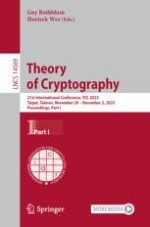2023 | OriginalPaper | Buchkapitel
3-Party Secure Computation for RAMs: Optimal and Concretely Efficient
verfasst von : Atsunori Ichikawa, Ilan Komargodski, Koki Hamada, Ryo Kikuchi, Dai Ikarashi
Erschienen in: Theory of Cryptography
Verlag: Springer Nature Switzerland
Aktivieren Sie unsere intelligente Suche, um passende Fachinhalte oder Patente zu finden.
Wählen Sie Textabschnitte aus um mit Künstlicher Intelligenz passenden Patente zu finden. powered by
Markieren Sie Textabschnitte, um KI-gestützt weitere passende Inhalte zu finden. powered by
